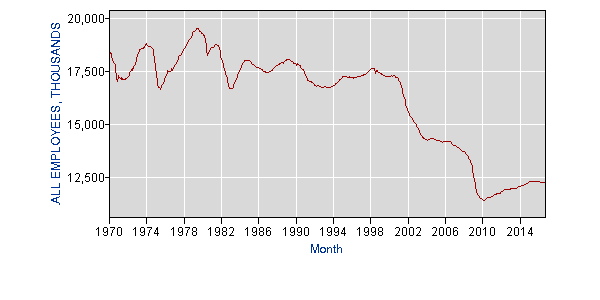January 05, 2017
Yet again the Washington Post tries to tell readers that trade has not been a major factor in the loss of manufacturing jobs in this century. It concluded an interesting piece on Ford’s decision to cancel plans for a plant in Mexico by telling readers:
“The president-elect has argued that trade policy has quashed American livelihoods, encouraging businesses to seek cheaper labor in other countries. He has criticized Ford, General Motors and Carrier on Twitter for shuttling work south of the border.
“A study last year from the Center for Business and Economic Research at Ball State University, a school in the manufacturing heartland, tells a different story. Co-author Michael Hicks, an economics professor, found that advances in technology caused far more job loss. That’s because automation has enabled factories to produce more goods with fewer people.“
Actually, automation is not new. It’s called “productivity growth” and has been going on for centuries, often much faster than it is today. As we can see, manufacturing employment remained roughly even, with cyclical ups and downs, from 1970 to 2000. It then plunged as the trade deficit exploded to almost 6.0 percent of GDP in 2005 and 2006 ($1.1 trillion in today’s economy).
Manufacturing Employment

Source: Bureau of Labor Statistics.
The basic story is that manufacturing employment was declining as a share of total employment through this whole period and undoubtedly would have continued to do so regardless of what happened with trade. However, the sharp plunge in employment that we saw in the years 2000 to 2007 (pre-crash) was due to the trade deficit.
It is remarkable that the Washington Post feels so much need to deny this simple fact. It is in the same vein as its refusal to correct its 2007 editorial claiming that NAFTA had led Mexico’s GDP to quadruple between 1987 and 2007. The actual number is 83 percent according to I.M.F data. A serious newspaper would correct such an egregious error.







Comments